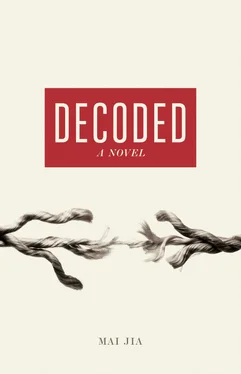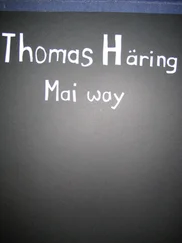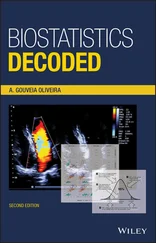Mai Jia - Decoded
Здесь есть возможность читать онлайн «Mai Jia - Decoded» весь текст электронной книги совершенно бесплатно (целиком полную версию без сокращений). В некоторых случаях можно слушать аудио, скачать через торрент в формате fb2 и присутствует краткое содержание. Год выпуска: 2014, Издательство: Allen Lane, Жанр: Современная проза, на английском языке. Описание произведения, (предисловие) а так же отзывы посетителей доступны на портале библиотеки ЛибКат.
- Название:Decoded
- Автор:
- Издательство:Allen Lane
- Жанр:
- Год:2014
- ISBN:нет данных
- Рейтинг книги:3 / 5. Голосов: 1
-
Избранное:Добавить в избранное
- Отзывы:
-
Ваша оценка:
- 60
- 1
- 2
- 3
- 4
- 5
Decoded: краткое содержание, описание и аннотация
Предлагаем к чтению аннотацию, описание, краткое содержание или предисловие (зависит от того, что написал сам автор книги «Decoded»). Если вы не нашли необходимую информацию о книге — напишите в комментариях, мы постараемся отыскать её.
Decoded — читать онлайн бесплатно полную книгу (весь текст) целиком
Ниже представлен текст книги, разбитый по страницам. Система сохранения места последней прочитанной страницы, позволяет с удобством читать онлайн бесплатно книгу «Decoded», без необходимости каждый раз заново искать на чём Вы остановились. Поставьте закладку, и сможете в любой момент перейти на страницу, на которой закончили чтение.
Интервал:
Закладка:
To tell you the truth, if she hadn’t written these answers, no one would ever have grasped the truth about Liseiwicz. We would never have realised his true identity and position, his sincere desires and shame, his indisputable pain and sorrow. In a very real sense, Liseiwicz’s departure for X country was far from being all there was to that story. The entire tale was something truly mind-boggling, a genuinely freakish combination of events.
* Translators’ note : Hope Schools, or xiwang xiaoxue , refer to privately run primary and elementary schools set up in poor rural areas of China. The schools are funded primarily by wealthy Hong Kong and Taiwanese social organizations.
To be honest with you, Fan Lili’s words demand patience in order to be appreciated and valued.
I give them to you below, word for word. The first time:
1. He (Liseiwicz) was not a code-breaker.
2. Since you already know that he wrote those letters in order to mystify you and put you on the wrong track, why do you still believe what he said? Those words were all lies — him a code-breaker? He created ciphers; he was the enemy of those who decipher them.
3. PURPLE was his creation!
4. This will take some explaining. It was the spring of 1946. A man had come looking for Liseiwicz, a fellow student from Cambridge. At that time, it seemed that this man was preparing to take charge of a very important post for the government of Israel. He took Liseiwicz to a church on Gulou Street, and in front of God and in the name of the millions of Jewish compatriots, requested him to devise a cipher for the State of Israel. Liseiwicz took more than a year to construct the cipher, but his sponsors didn’t seem to care; they were ever so pleased. Since the time he was a small child, Liseiwicz had grown up surrounded with adulation: his ego was very strong and it wouldn’t let him fail. But because he didn’t have enough time in which to work on it, it was somewhat rushed — at least for him — and he began to feel that there were many flaws within it; so he took it upon himself to devise a new cipher to take its place. This was when he was hopelessly drawn deeper and deeper into the bewildering world of cryptography. Finally, after nearly three years of work, he succeeded in devising a cipher he could be satisfied with. That cipher was PURPLE. He then requested that the Israeli authorities replace his previous cipher with this new one. They decided to experiment with it, but the result was not what he expected: PURPLE turned out to be too difficult; there was no way that they could use it. At the time, the famous cryptanalyst Klaus Johannes was still living. It was said that after he saw a secret telegram encrypted with PURPLE, he remarked. ‘I would like to have three thousand similarly encrypted telegrams come across my desk, all waiting to be deciphered, but in the current situation,* I will probably only see a thousand.’† The meaning of this statement was clear — in however many years he had left, he would not be able to crack this cipher. Once X country got wind of this, they immediately thought of buying PURPLE, but at that time we had not yet decided to leave N University. What is more, considering the strained relationships between X country and China, we decided that it was best not to respond to this proposal. What happened later was as you described it: in order to rescue my father, we used PURPLE to make a deal with X country.
5. Yes, he believed that Rong Jinzhen would sooner or later decipher PURPLE, and so he made every effort to impede his progress.
6. In the entire world, there was only one person he admired and that was Rong Jinzhen. He believed that concentrated within Jinzhen was the sum of all Western knowledge and wisdom, something only seen once every hundred years. 7. I’m tired, another day.The second time:
1. This, using the words of a military intelligence analyst, is for external dissemination. In fact, he (Liseiwicz) was still engaged in the development of ciphers.
* At the time, World War II had ended and there was no large-scale conflict taking place.
† The absence of war meant that for the moment there were not as many coded telegrams being sent back and forth.
2. A high-level cipher is like the main actor in a play: there has to be an understudy. When developing a high-level cipher, generally two are created: one for use, the other in reserve. But the essence of PURPLE was derived from Liseiwicz’s very own character; it was impossible for him to simultaneously create two ciphers. Furthermore, when he was constructing PURPLE he never once thought that it would become a high-level cipher. When he created it, it was as though he had researched and developed an entirely new language, a language that itself required considerable precision. But once X country decided to use PURPLE as a high-level cipher, they immediately determined that a reserve cipher would have to be created; this understudy was none other than BLACK.
3. Correct, as soon as he set foot in X country he was immediately whisked away to participate in the development of BLACK. But to be precise, he served as an observer of the work.
4. Strictly speaking, one man can only create one high-level cipher. His participation in the development of BLACK was as an observer, meaning that he was not directly engaged in the research. His role was to highlight clearly the special characteristics of PURPLE, to work in tandem with the researchers, to guide them away from making a simple replica of PURPLE. Sort of like a navigator. For instance, if PURPLE set its gaze upon the sky, then he would ensure that BLACK directed its attention towards burrowing into the ground. How it was to in fact burrow into the ground was for the actual researchers to determine.
5. Before they learned that Jinzhen had cracked PURPLE, the underlying structure of BLACK had already been completed — the two ciphers were about the same level of difficulty. Making them difficult is the primary aim of creating high-level ciphers; why else would the field of cryptography gather in the most talented and erudite of people if not because everyone wishes to confound and baffle their opponents? But, after learning that Jinzhen had deciphered PURPLE, he became adamant about the need to make revisions to BLACK. He had the distinct feeling that since Jinzhen had been able to crack PURPLE, he could do the same with BLACK. He knew this because he knew Jinzhen: he knew the type of person he was, and he appreciated his innate talent, a talent that only became more excited and aroused when confronted with a difficult and seemingly impenetrable problem — more determined to solve it. Nothing would stop him, not even death. If death would not stop him, then the only remaining option was to devise some means to thoroughly baffle and confuse him, to introduced manoeuvres that would challenge his entire way of thinking: this was the only way to defeat him. As a result, BLACK was revised, but not in a traditional manner. Rather, the cipher had become almost absurd; certain sections were extremely impenetrable, whilst others were incredibly easy: it was neither fish nor fowl but something nondescript. To use Liseiwicz’s own words, it was like a man who on the outside appears absolutely refined and exquisite, but underneath is wearing neither underpants nor socks.
6. You’re absolutely right,* but Jinzhen understood Liseiwicz’s mind too well. You could say that cracking PURPLE was akin to him and Liseiwicz sitting down to play a game of chess; he would not be distracted by Liseiwicz. Since he couldn’t be distracted, it was possible for him to go on to crack other ciphers. But BLACK was not broken in this manner.
7. I don’t agree with what you said:† after all, even if such a person existed there would have been no way that he could have accomplished everything himself, he must have relied upon what Jinzhen wrote in his notebook.
Читать дальшеИнтервал:
Закладка:
Похожие книги на «Decoded»
Представляем Вашему вниманию похожие книги на «Decoded» списком для выбора. Мы отобрали схожую по названию и смыслу литературу в надежде предоставить читателям больше вариантов отыскать новые, интересные, ещё непрочитанные произведения.
Обсуждение, отзывы о книге «Decoded» и просто собственные мнения читателей. Оставьте ваши комментарии, напишите, что Вы думаете о произведении, его смысле или главных героях. Укажите что конкретно понравилось, а что нет, и почему Вы так считаете.












